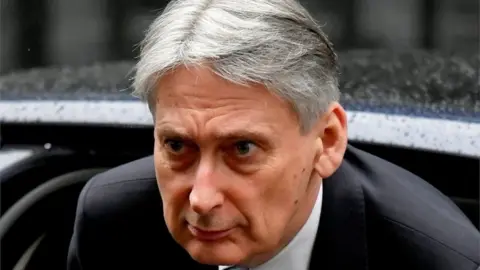Chancellor needs 'an urgent spending review', IFS says
 Philip Hammond
Philip HammondBritain needs an "urgent" spending review to address key national economic issues, one of the UK's leading economic experts says.
Paul Johnson, head of leading economic research group the Institute for Fiscal Studies, said financing issues around benefits, education and social care should not be delayed much longer.
His remarks follow the chancellor's Spring Statement on Wednesday.
While Brexit matters, it is not the only thing that matters, he said.
Mr Johnson's analysis said that although Philip Hammond's Spring Statement was not expected to be a big fiscal event, "by once again declining to set totals for the forthcoming spending review, [Mr Hammond] deferred making some of the biggest non-Brexit decisions of the parliament".
Mr Johnson suggests that Brexit issues are diverting attention from other key economic concerns facing the UK: the benefits squeeze, education funding, and the social care green paper.
"Waiting for the green paper" has become rather like Waiting for Godot... It didn't even merit a mention. The Augar review of funding further and higher education was at least acknowledged, though we still await its conclusions," Mr Johnson said.
He added: "There's plenty that needs fixing and there are ways of raising more revenue, but they need to be carefully thought out and implemented if they are to be both effective and fair."
On Wednesday, Mr Hammond pledged to spend a £26.6bn Brexit war chest to boost the economy, if MPs vote to leave the European Union with a deal.
Philip Hammond vowed to free up more money to help end austerity in a "deal dividend". However, he said tax cuts and spending rises depended on a smooth Brexit.
Mr Hammond used his Spring Statement to warn that a disorderly Brexit would deal a "significant" blow to economic activity in the short term.
Mr Johnson said there was a consensus among economists that the UK economy would have been about 2% bigger had the Brexit referendum not occurred.
"In those circumstances the deficit would have been smaller still and the fiscal room for manoeuvre greater. The end of austerity could already have been rather more decisively with us," he said.
